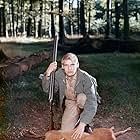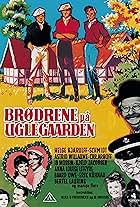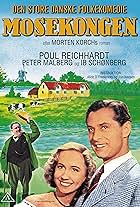Martin returns home with a good amount of money in his pocket after he has worked on Greenland.Martin returns home with a good amount of money in his pocket after he has worked on Greenland.Martin returns home with a good amount of money in his pocket after he has worked on Greenland.
- Directors
- Writers
- All cast & crew
- Production, box office & more at IMDbPro
Storyline
Featured review
Der brænder en ild (1962) is a Danish classic film directed by Alice O'Fredericks and Robert Saaskin, starring some of the most iconic Danish actors of the time. Poul Reichhardt, who played the role of Martin, was one of the most beloved actors in Danish cinema and television, having appeared in numerous films and TV shows throughout his career. Reichhardt's performances were often characterized by his strong presence and charming personality, making him a beloved figure in Danish film.
The film takes place in a small Danish village and revolves around the Hovmann family and their struggle over their inheritance. Just Hovmann (William Rosenberg) and his wife Martha (Astrid Villaume) have been running their family farm since Just's retirement, but their financial situation is precarious due to a debt owed to Bent Nisted (Jørn Jeppesen) and his wife Abelone (Marie Brink). The debt puts their ownership of the farm in jeopardy, as Bent and Abelone have threatened to foreclose on the property if the debt is not paid.
Meanwhile, Martin, Just's brother, returns to the village after nine years in Greenland and Canada. His return sparks jealousy in Just, who is afraid that Martin's presence will cause Martha to remember her former feelings for him. Martin, however, has plans of his own and wants to use his savings to start a machinery business. As tensions rise between the two brothers, the family's financial problems escalate, and it seems that they will lose their farm.
Despite the bleak outlook, the film manages to resolve the conflicts in a satisfying manner. Two standout musical scenes in the film are both catchy and toe-tapping, adding to the film's charm. While some may find the resolution a little too neat, the film is generally a good watch, with a nice setting often seen in classic films set on a farm in the Danish countryside, handling themes of love and family inheritance.
Overall, Der brænder en ild is an important film in Danish cinema history, and its enduring popularity speaks to its timeless appeal. The film's use of the Danish language and its depiction of rural life in Denmark make it a valuable cultural artifact that offers a glimpse into Danish society during the 1960s.
The film takes place in a small Danish village and revolves around the Hovmann family and their struggle over their inheritance. Just Hovmann (William Rosenberg) and his wife Martha (Astrid Villaume) have been running their family farm since Just's retirement, but their financial situation is precarious due to a debt owed to Bent Nisted (Jørn Jeppesen) and his wife Abelone (Marie Brink). The debt puts their ownership of the farm in jeopardy, as Bent and Abelone have threatened to foreclose on the property if the debt is not paid.
Meanwhile, Martin, Just's brother, returns to the village after nine years in Greenland and Canada. His return sparks jealousy in Just, who is afraid that Martin's presence will cause Martha to remember her former feelings for him. Martin, however, has plans of his own and wants to use his savings to start a machinery business. As tensions rise between the two brothers, the family's financial problems escalate, and it seems that they will lose their farm.
Despite the bleak outlook, the film manages to resolve the conflicts in a satisfying manner. Two standout musical scenes in the film are both catchy and toe-tapping, adding to the film's charm. While some may find the resolution a little too neat, the film is generally a good watch, with a nice setting often seen in classic films set on a farm in the Danish countryside, handling themes of love and family inheritance.
Overall, Der brænder en ild is an important film in Danish cinema history, and its enduring popularity speaks to its timeless appeal. The film's use of the Danish language and its depiction of rural life in Denmark make it a valuable cultural artifact that offers a glimpse into Danish society during the 1960s.
- WillInDenmark
- Apr 17, 2023
- Permalink
Details
- Release date
- Country of origin
- Language
- Also known as
- Det brenner en ild
- Production company
- See more company credits at IMDbPro
- Runtime1 hour 44 minutes
- Sound mix
Contribute to this page
Suggest an edit or add missing content




















